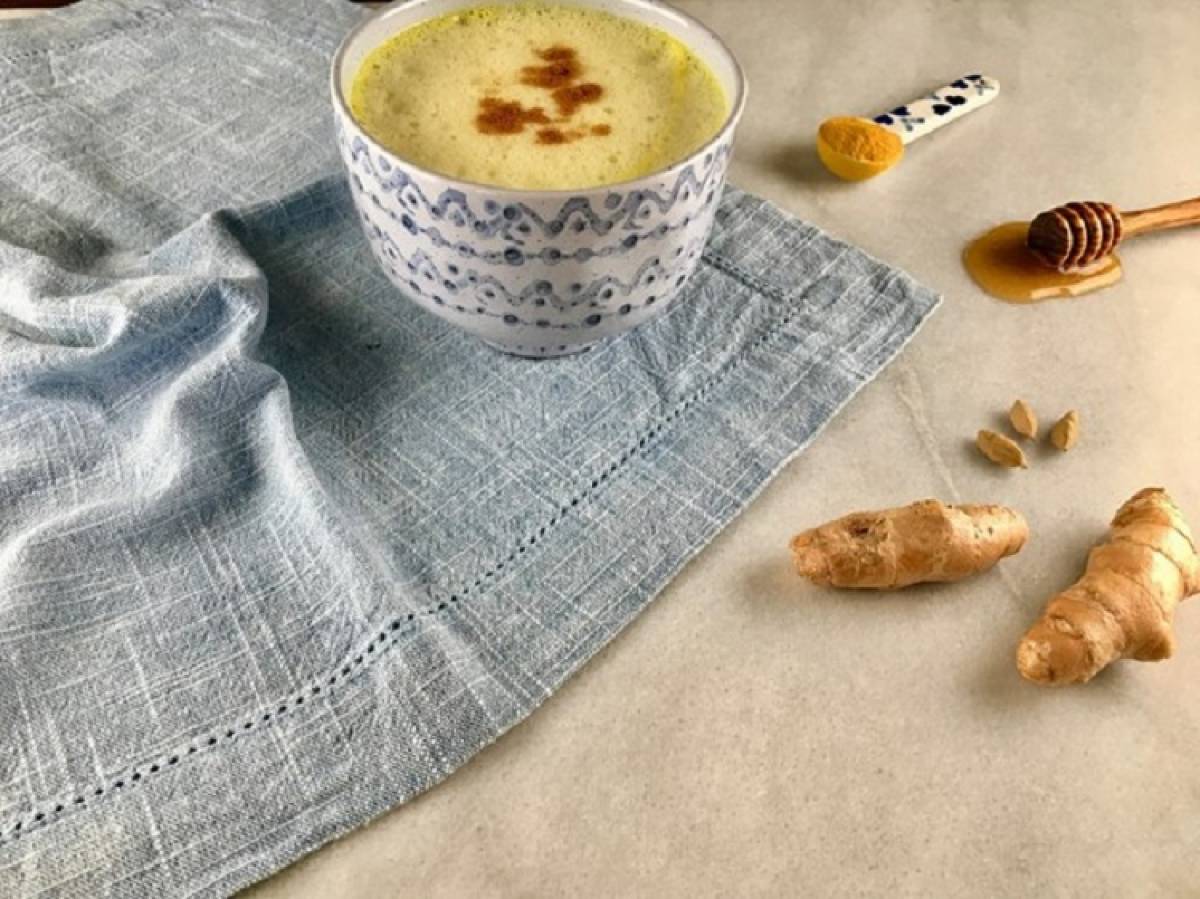Facts & Health Benefits of Ginger Tea You Should Know

Ginger tea, cherished for its pleasant aroma, pungency, and medicinal properties, is drawn from the ginger plant that belongs to the family Zingiberaceae, which also includes turmeric, cardamom, and galangal.
Ginger has been used for thousands of years in different cultures around the world, dating back over 5000 years. It is a thick underground stem that sprouts roots and shoots and was used as a flavoring agent long before history was formally recorded.
Historically, ginger was carried by traders into the Middle East and the Mediterranean from its origins in South East Asia around the 1st century CE. It is thought to have first grown in the Islands of Greater Sunda and Southern India.
Interesting Facts about Ginger
Ginger is a cultigen - known only in cultivation with no known wild ancestor. However, as one of the oldest medicinal plants cum spice, ginger is mentioned in old historical sources, including the Bible, Koran, and the Talmud.
But that’s not all that’s interesting about ginger:
- Among the first written records about ginger comes from Confucius in his literary compilation classic, Shi-ching (the Book of Songs). It is believed that Confucius eat ginger with every meal. To date, ginger is featured in meals throughout China.
- The size of the ginger seed, called a rhizome, is essential to the propagation of ginger. A bigger seed/rhizome generally holds larger food for the ginger plant, which means quicker and quality growth of the plant.
- The concentration of the essential oils found in ginger increases as ginger ages. It is, therefore, recommended that ginger oil not be extracted from ginger until it has been harvested for a minimum of 9 months.
- In the 13th and 14th centuries, a pound of ginger was equivalent to the cost of a sheep.
- When ginger is pickled in sweet vinegar, it turns to the color pink, which is often seen in sushi.
- Queen Elizabeth I of England, who reigned from 1558-1603, has been credited with the invention of the gingerbread man. Apparently, she loved throwing lavish royal dinners that included things like marzipan shaped like fruit, castles, and birds. But the Queen's court also included a royal gingerbread maker.
- The top five countries that produce the most ginger are India (producing 34.6%), China (producing 19.1%), Nepal (10.6%), Nigeria (7.8%), and Thailand (7.5%), as of 2017.
- Ginger possesses a therapeutic action called a sialagogue which is responsible for stimulating saliva production.
- Ground/dried ginger may have a higher medicinal/nutritional value than raw/fresh ginger root. Fresh ginger primarily contains gingerol, but it changes when exposed to heat/dried to produce ground ginger. The gingerol converts into shogaol. Both active ingredients have anti-inflammatory and antioxidant abilities, but studies suggest the shogaol in ground ginger may be more potent in these roles than gingerol.
- The flavor and pungency of dried ground ginger differs from those of fresh ginger root. You may substitute one for the other, but each tends to work better in different types of dishes. Fresh ginger is used more often in savory dishes, especially in Asian cuisine, whereas ground ginger is preferred for spiced drinks and baked food.
How to Consume Ginger Tea
One of the best ways to consume ginger is as ginger tea. Ginger can also be added to desserts and meals, as well as to juices. Fresh ginger can also be added to water and consumed.
You can make your ginger tea with either the fresh root, dried ginger, or using a tea bag. While taking ginger tea is known to have anxiety-relieving, anti-inflammatory, antioxidant, and other positive effects and benefits, beware of some known cons.
Drinking ginger tea without moderation can have adverse effects. For example, one study suggests that ginger may have adverse effects during pregnancy. These effects may include anticoagulant (blood-thinning effects) and allergic reactions.
Nevertheless, two or three cups of ginger tea per day will usually not cause adverse side effects for healthy individuals with no prior health conditions.
Some turmeric infusions can add more beneficial properties to your ginger tea. You can also use the best full spectrum CBD oil for stress relief and to boost your immune system.
The best time to drink ginger tea is usually in the morning. However, it can be taken any time during the day or with any meal. If ginger tea is taken in the morning, it is known to re-vitalize the body and awaken people much faster than a traditional cup of coffee.
That said, some serious health conditions may not take well to ginger infusions at all, such as heart diseases, gallstones, and diabetes. Avoid drinking ginger tea before consulting your doctor if you have any of those conditions.
Other than that, ginger is generally recognized by the Food and Drug Administration (FDA) as safe and ginger tea itself is quite a refreshing beverage offering a myriad of health benefits ranging from boosting the metabolism to treating pain and naturally fighting bacteria.
Health Benefits of Ginger Tea
As already mentioned, ginger has been used since ancient times for its unique flavor and spiciness, as well as for its medicinal properties to treat and prevent different health conditions.
Below are some of the health benefits of ginger tea recognized today:
1. Relieves Nausea
Studies show that the active component gingerols found in ginger helps to alleviate nausea and vomiting resulting from pregnancy, chemotherapy, and motion sickness.
Ginger tea can thus be effective for relieving nausea during pregnancy and after chemotherapy treatment. Researchers also suggest that ginger might be a worthwhile alternative to traditional anti-nausea drugs in some cases.
However, you should always consult your doctor before taking this tea during pregnancy, or when taking prescription medications as there may be some unwanted side effects.
2. Reduces bad cholesterol
Ginger tea can also reduce the level of bad cholesterol in the body. Bad cholesterol, also known as LDL, raises your chances of health problems like a heart attack or stroke.
Studies have shown that people who consumed three grams of ginger three times a day (about half of a teaspoon) experience a decrease of bad cholesterol levels in blood in a short period.
The level of triglyceride is also noticeably lowered while using ginger infusions.
3. Improves digestion
Ginger tea helps your body digest food better. It also helps to stave off-gases and bloating.
After a cup of ginger tea, your stomach will be calm, and you will feel the lightness in your body.
Not only that, but ginger sweets can also help with digestion after a late dinner. Eat a ginger candy and you will immediately notice the effect of this miracle plant.
4. Relieves pain
Many users report ginger tea alleviates muscle aches, arthritis, headaches, and other types of pain, including osteoarthritis of the knee.
The inflammation reducing characteristics of ginger help to switch off the source of the pain.
A body of scientific studies supports drinking ginger tea can strongly decrease chronic pain, muscular disorders, and alleviate the side effects of some therapies that are painful.
5. Soothes irritated skin
Cold weather and cleaning chemical substances very often irritate the skin causing dryness. Taking ginger tea can treat these symptoms from the inside.
The red irritated skin can be soothed with the constant intake of ginger tea, while using ginger root will help to reduce the swelling and redness of your skin. It also diminishes scars.
Ginger has potent antioxidant elements that positively affect skin damages and skin problems.
6. Protects skin for a younger appearance
Nearly all skincare products contain the word “antioxidant.” Antioxidant components of ginger have been studied and proven, with about 40 antioxidants present in this plant.
The antioxidants in ginger tea protects the skin from free radicals that cause your skin to look older and dull. It maintains the skin collagen production and smooths it.
Moreover, the antioxidants in ginger tea helps to reactivate skin cells that are not reproducing anymore. Through this process your skin revives, looks younger, and stays healthy.
7. Reduces risk of cardiovascular disease
One of the most important properties of ginger is its blood-thinning characteristic. Drinking ginger tea regularly reduces the possibility of blood clot formation, which itself reduces the risk of heart disease and suffering a heart attack.
Nevertheless, it is essential to consult a qualified doctor before taking ginger tea for this purpose. Doctors will provide the best individual advice for using natural remedies like ginger.
8. Eases menstrual cramps
Many women experience abdominal pain during their periods and pain calming pills are a common part of treatment, with ibuprofen or paracetamol often taken in these cases.
However, there is a natural alternative to these pills and treatment for period cramps—ginger. Drink ginger tea three times a day during your menstrual cycle. You will feel much better.
In addition, there is some scientific evidence that ginger may also help control heavy menstrual bleeding.
9. Fights cancer
Both shogaols and gingerols components in ginger have anticancer benefits. In lab studies, researchers have found ginger fights different types of cancer cells, including pancreatic cancer and colon cancer.
Ginger acts against cancer-causing cells to reduce their activity. By having the activity of cancer-causing cells decreased, these cells start dying at the molecular level and do not evolve. Thus, regular consumption of ginger tea can help to prevent occurrence of cancer.
10. Reduces blood pressure
Besides protecting against cancer, studies also show that ginger can reduce blood pressure. It may even be as effective as some typically used medications.
In conclusion
Drinking ginger tea is great for your health. It not only nourishes your body and prevents dehydration, but also boost your body’s metabolism, fights bad bacteria and viruses, while also warding off and treating a host of medical conditions.
The sweet and appealing taste is an added bonus from the amazing and mighty ginger.






















